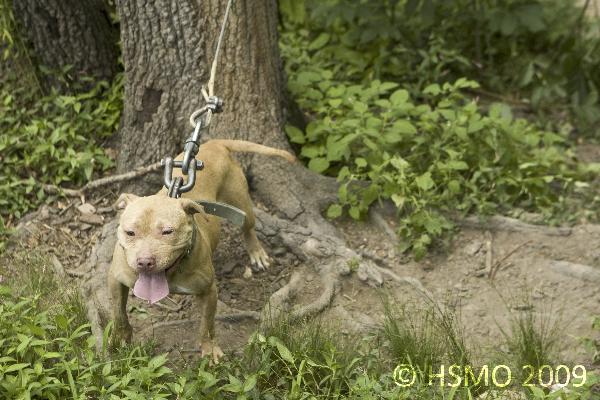Article from: NPR Website
DNA Is New Weapon In Fight Against Dogfighting
by Amy Standen
September 27, 2010 from KQED
To read transcript of radiospot/interview, click HERE
Scientists are hoping that a new DNA database for dogs will help track — and prosecute — people who breed dogs to fight. But advocates say there’s a risk that the DNA records could be used against the dogs, or against people who adopt them.
The idea is to have a canine version of the FBI’s CODIS — a database of human DNA that is used to connect criminals to crime scenes. But in this case, the DNA might help prove that breeders supplied dogs to a dogfighting ring.
In July 2009, a dogfighting operation was raided in northwest Missouri. Tim Rickey, the senior director of field operations for the American Society for the Prevention of Cruelty to Animals, recalls the scene from that morning.
Dogfighting’s Innocent Victims
Credit: Photos courtesy of the Humane Society of Missouri
“I very vividly remember getting out of the truck, and one of the first images I seen was a dog that had one of its legs chewed off in a fight,” Rickey says. “And then the owners just amputated the leg.”
More than 500 dogs were seized from sites across seven states that day, and authorities arrested 26 people. It was the largest dogfighting raid in U.S. history. Rickey says he has heard all of the excuses.
“What their cover is, is that they’re just breeding the dogs,” he says. “They don’t fight the dogs, you know — they’re just breeding dogs because they’re a lover of the breed.”
In the Missouri case, DNA samples from the dogs proved that these weren’t just random pound dogs. They were all related. Prosecutors believed this was evidence that the dogs had been bred to fight.
And that makes sense, says Beth Wictum, who directs the forensics lab at the School of Veterinary Medicine at University of California, Davis.
“Essentially by breeding these dogs they’re creating a subpopulation, almost a new breed,” she says.
“Just as with Labradors, they may try and concentrate certain aspects of pointing or retrieving, there are behavior traits that they’re trying to concentrate within this subpopulation.”
Working with the ASPCA, Wictum is compiling a database called the Canine Combined DNA Index System. So far, it includes about 400 samples taken from inside the cheeks of fighting dogs, including those seized in the Missouri raid. It’s designed to help law enforcement go after not just the fight operators but also the breeders.
Rickey says that’s where the money is.
“For most of these fighters, it all comes down to creating a champion, and then to breed that champion,” he says.
Breeders can get as much as $20,000 for a puppy from a champion bloodline, according to Rickey.
And genetic proof of that bloodline could go a long way in court, he says, by helping convince a jury that a suspected breeder is supplying dogfighting rings across the country.
Still, the dog database makes some people very nervous — among them, Ledy VanKavage, an attorney for the Best Friends Animal Sanctuary in Kanab, Utah.
“I’m not convinced this is a good thing for dogs,” she says.
VanKavage is also the owner of Karma, a pit bull whose DNA is in the database. Karma was a fighting dog rescued from the Missouri bust in 2009. By VanKavage’s account, she Karma has turned out to be a wonderful pet, whatever her DNA might suggest.
“We know that if DNA was the be all and end all, all of Secretariats’ foals would be champions and win the Triple Crown. And they don’t,” VanKavage says.
She said she worries that the genetic information could be like a scarlet letter on the dogs, precluding even the gentle ones from being adopted. Companies could refuse to sell homeowners insurance to people who adopt former fighting dogs. That would be unfair, she says, because as with people, DNA is not destiny.
“We’re not a prisoner of our genetics,” VanKavage says. “Each dog, like each person, is an individual and should be judged on their own character.”
Rickey and Wictum agree on that point — that the DNA records say much more about people who breed dogs than it says about the dogs themselves. In the Missouri dogfighting case, everyone who has been charged with a crime has pleaded guilty.
